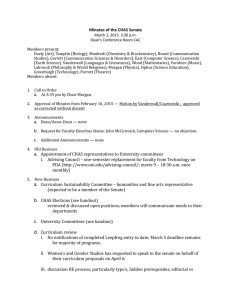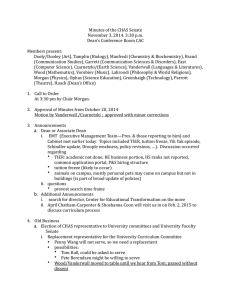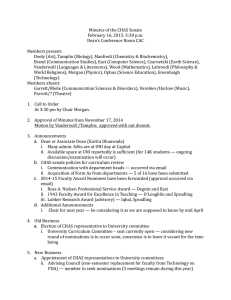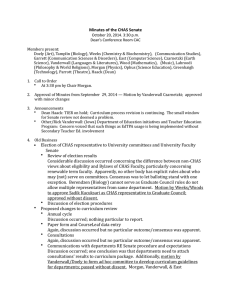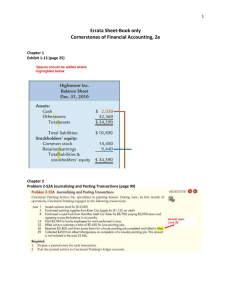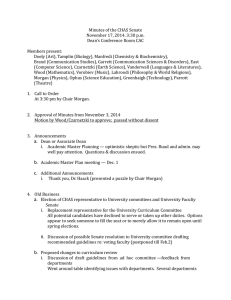Minutes of the CHAS Senate March 4, 2013
advertisement
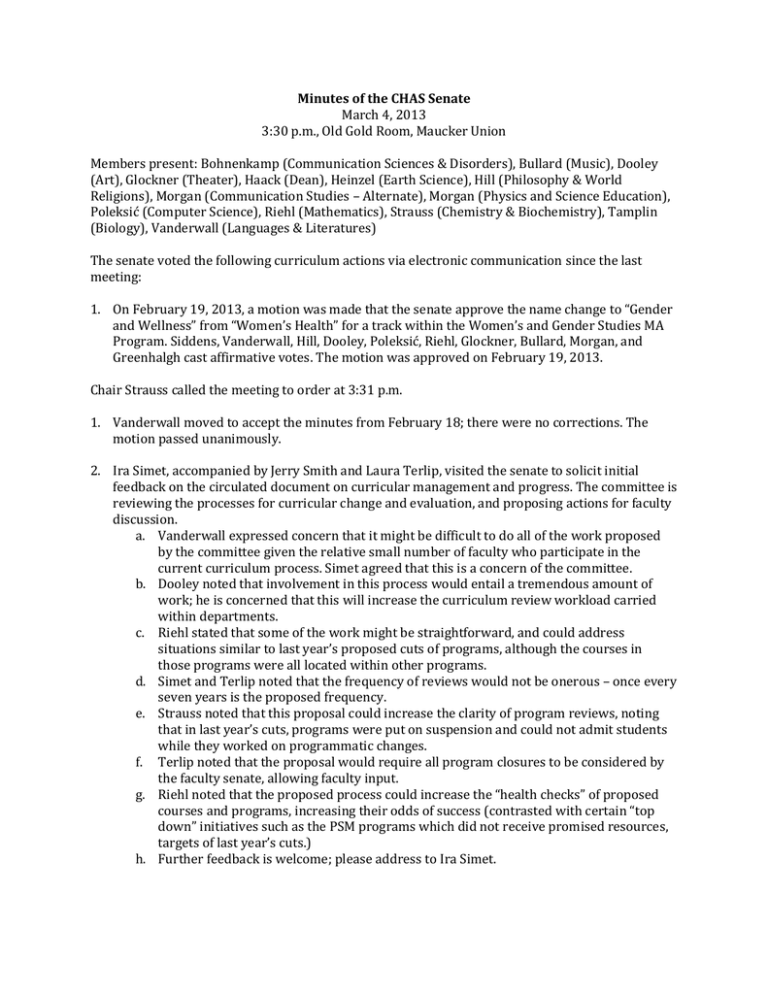
Minutes of the CHAS Senate March 4, 2013 3:30 p.m., Old Gold Room, Maucker Union Members present: Bohnenkamp (Communication Sciences & Disorders), Bullard (Music), Dooley (Art), Glockner (Theater), Haack (Dean), Heinzel (Earth Science), Hill (Philosophy & World Religions), Morgan (Communication Studies – Alternate), Morgan (Physics and Science Education), Poleksić (Computer Science), Riehl (Mathematics), Strauss (Chemistry & Biochemistry), Tamplin (Biology), Vanderwall (Languages & Literatures) The senate voted the following curriculum actions via electronic communication since the last meeting: 1. On February 19, 2013, a motion was made that the senate approve the name change to “Gender and Wellness” from “Women’s Health” for a track within the Women’s and Gender Studies MA Program. Siddens, Vanderwall, Hill, Dooley, Poleksić, Riehl, Glockner, Bullard, Morgan, and Greenhalgh cast affirmative votes. The motion was approved on February 19, 2013. Chair Strauss called the meeting to order at 3:31 p.m. 1. Vanderwall moved to accept the minutes from February 18; there were no corrections. The motion passed unanimously. 2. Ira Simet, accompanied by Jerry Smith and Laura Terlip, visited the senate to solicit initial feedback on the circulated document on curricular management and progress. The committee is reviewing the processes for curricular change and evaluation, and proposing actions for faculty discussion. a. Vanderwall expressed concern that it might be difficult to do all of the work proposed by the committee given the relative small number of faculty who participate in the current curriculum process. Simet agreed that this is a concern of the committee. b. Dooley noted that involvement in this process would entail a tremendous amount of work; he is concerned that this will increase the curriculum review workload carried within departments. c. Riehl stated that some of the work might be straightforward, and could address situations similar to last year’s proposed cuts of programs, although the courses in those programs were all located within other programs. d. Simet and Terlip noted that the frequency of reviews would not be onerous – once every seven years is the proposed frequency. e. Strauss noted that this proposal could increase the clarity of program reviews, noting that in last year’s cuts, programs were put on suspension and could not admit students while they worked on programmatic changes. f. Terlip noted that the proposal would require all program closures to be considered by the faculty senate, allowing faculty input. g. Riehl noted that the proposed process could increase the “health checks” of proposed courses and programs, increasing their odds of success (contrasted with certain “top down” initiatives such as the PSM programs which did not receive promised resources, targets of last year’s cuts.) h. Further feedback is welcome; please address to Ira Simet. 3. The senate continued consideration of the proposed implementation of the Cornerstone courses, proposed to fulfill the LAC 1A and 1B requirements. Julie Husband and David Grant were present from Languages and Literatures to share some concerns about the course from their department. April Chatham-Carpenter and Deirdre Heistad were present to speak on behalf of the Cornerstone courses, as well as Senator Hill, who has taught the course. a. Among the concerns expressed by faculty from Languages & Literatures: The Cornerstone course seems to lack emphasis on the writing process instead of the end product. Significant class time is used for student affairs seminars, taking away from time on the core academic subjects of written and oral communication. Instructors for the course may not be trained even at the level required to teach writing at the community college level – 6 hours of writing methods courses. While the Cornerstone course has produced data that they claim shows the objectives of Categories 1A and 1B in the LAC being met, some within Languages & Literatures question whether the data supports the meeting of category objectives. Standardizing all sections of a course facilitates assessment, but comes at the price of individualization, which can highlight individual instructor strengths. Languages & Literatures prefers to continue the dialogue regarding issues of concern and keep the course at experimental status with fewer sections offered. (Current plans are to offer more sections of Cornerstone in Fall 2013 than either College Writing and Research or Oral Communication.) b. Among the arguments made by the Cornerstone course faculty: The Cornerstone course has produced a large amount of data that (in their view) shows the course meeting all of the published objectives of LAC categories 1A and 1B. In their view, Cornerstone has established valuable cross-campus collaborations and discussion The Cornerstone staff continues the dialogue with those who have expressed concerns, including consideration of different models of the course where students are brought to campus early for some of the student affairs elements currently taking place during class time. Chatham-Carpenter and Heistad both expressed the desire to keep some elements of student affairs programming within Cornerstone. The Liberal Arts Core committee unanimously approved the course for inclusion in the LAC. Cornerstone faculty are concerned with what they view as stonewalling by some in Languages & Literatures. In their view, they have engaged in numerous conversations regarding concerns about the course, and some faculty will not be pleased unless the course looks exactly like College Writing and Research. c. Among the subsequent discussion by the senate: Jayne Morgan noted that the Communication Studies department voted unanimously to approve the Cornerstone proposal. Dooley stated that it was difficult to choose between the enthusiastic endorsement of members of Cornerstone leadership, versus the expressed concerns of the Languages & Literatures faculty with expertise in writing and teaching writing. Haack stated that the course might be continued experimentally, as it has yet to be offered three times. Riehl asked about the staffing of the course. Haack stated that he favored working with the relevant departments (Languages & Literatures and Communication Studies) to assign instructors, though at present faculty from any department can apply to teach the course. Haack noted that in the future, money for faculty development would not be available. Glockner stated that the Cornerstone faculty presented their group as extremely responsive, and asked whether the Languages & Literatures faculty felt that way. Vanderwall stated that there were some colleagues within L&L who felt that their input to the course was not valued. Glockner asked (rhetorically) whether they would ever feel comfortable. Vanderwall stated that (in his view) the two sides are not too far apart, though the truly collaborative conversation has just started. There was some confusion as to whether the senate was voting to approve the course as part of the regular curriculum review, or for inclusion in the LAC. (Post meeting, Strauss confirmed with Associate Provost Licari that the senate is at present only considering whether or not the course can be part of the Liberal Arts Core.) Riehl stated that she was ready to vote; Vanderwall argued that we should take more time to consider, and noted that at this point in the conversation some senators had left. d. Vanderwall moved to table consideration of the proposal until the next senate meeting; Morgan seconded. Bullard, Dooley, Glockner, Morgan, Morgan, Poleksić, Riehl, Tamplin, and Vanderwall voted in favor; Hill opposed. The motion passed. 4. Vanderwall moved for adjournment at 5:10 p.m. The motion was unanimously approved. Respectfully submitted, Jeff Morgan CHAS Senate Secretary
